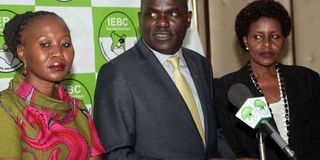IEBC unable to shake off ballot tender furore

IEBC Chairman Wafula Chebukati (centre) and other officials at Anniversary Towers in Nairobi on March 24,2017 where they announced that they will procure the Kenya Integrated Elections Management system directly from Safran Identity and Security. PHOTO | EVANS HABIL | NATION MEDIA GROUP
What you need to know:
- The IEBC is now grappling with the resultant grumbling from the original companies.
- Some IEBC officials who sought anonymity poked holes in the process, saying that the award criteria is ambiguous.
The Independent Electoral and Boundaries Commission is on the spot over the manner it handled the tender process for the acquisition of ballot papers worth Sh2.5 billion.
The electoral body is racing against time to have the ballot papers ready after a long running court battle scuttled its initial plans.
In September 2016, the commission awarded the tender to Al Ghuair Printing and Publishing Company which was immediately challenged by Paarl Media at Public Procurement Administrative Review Board.
The matter dragged on until April this year when the Court of Appeal concurred with the ruling of the High Court that there should be a fresh tender process.
The Court of Appeal rendered its decision on April 26 and directed IEBC to restart the tender process.
A week before the Court of Appeal’s decision, IEBC chief executive Ezra Chiloba was quoted widely in the media, saying that the commission will conduct a restricted tender. This meant that only the companies that had participated in the aborted attempt would be allowed to re-submit tenders.
“The IEBC is inviting all the vendors who participated in the last one together with those who have since expressed interest to supply ballot papers to Kenya. That will be the most logical and fair approach in the circumstance,” Mr Chiloba had said.
A week after the Court of Appeal decision, the commission uploaded the tender documents on its website and gave interested bidders seven days to tender their documents.
It emerged that the commission had sent bid documents to some of the companies that had participated in the initial tender before uploading the documents.
The original companies that had bid in 2016 were Ellams Products Ltd, Manipal Technologies Ltd, Paarl Media (Pty) Ltd, KL Hi-tech Secure Print Ltd, Al Ghuraiar Printing and Publishing, Baltijas Banknote, Digit Print Supplies SRL, Tall Security Print Ltd, and United Printing and Publishing.
The firm that had won the previous tender, Al Ghuraiar did not receive the bid documents and protested to the commission when it learned its rivals had received the documents.
The IEBC is now grappling with the resultant grumbling from the original companies after it emerged that a company that did not participate in the process had been allowed to bid this time round.
This came to the fore when the new entrant, GI Solutions Group, sent representatives to attend the pre-bid conference on April 28.
When contacted, IEBC communication director Andrew Limo said though the tender was restricted, those who had shown interest were invited including GI Solutions.
“This was restricted to those who participated in the original tender plus those who showed interest in writing before the tender issue date,” he said, adding bidders had 14 days to prepare tender documents.
But some IEBC officials who sought anonymity poked holes in the process, saying that the award criteria is ambiguous and prone to mischief.
“The tender will be awarded to the bidder with the lowest total cumulative unit price for all or part of the elective positions. This is erroneous as it lacks the objectivity of the award criteria. This award criteria is likely to confuse the evaluation committee as it provides for two distinct award criteria it cannot allow cumulative and allow partial award,” said one official who spoke to the Sunday Nation in confidence.
But Mr Limo said the law was adhered to at every stage of the tendering process.





